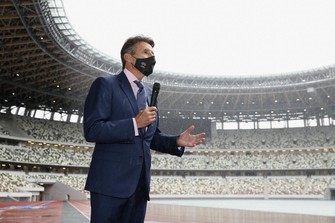Athletics boss Sebastian Coe hails National Stadium as sport's new home in Japan

TOKYO (Kyodo) -- World Athletics President Sebastian Coe praised the new venue for the "Olympics' No. 1 sport" on his first visit to the completed National Stadium in Tokyo on Thursday.
Coe said the objective of his visit is to inform the organizing committee that he wants to work in close conjunction to make the games a success at a time when the world is looking to sport for a way to connect amid the worldwide coronavirus pandemic.
"As an international federation, this is the right moment to be having that kind of input," he said before his meeting with Yoshiro Mori, president of the Tokyo 2020 Organizing Committee, and Tokyo Gov. Yuriko Koike later on Thursday.
"When I meet Gov. Koike it is important that I make the point that we want athletics to have a permanent home in Japan. It's a country that really does understand our sport," he said.
Coe also said bringing the world championships back to the stadium in central Tokyo would be a "perfect solution" as maintaining the track and warm-up facility "will be a very, very important legacy for Japanese sport and an important legacy for World Athletics."
Coe called the 1991 world championships in Tokyo "one of our best ever" and the 2007 world championships in Osaka "fantastic" while explaining how important it is "for our sport and for our legacy" to have top-class athletics events in Japan.
After inspecting the National Stadium, which was completed last November, wearing a protective face mask, Coe said," I'm very, very impressed" having only previously visited while it was under construction.
"The stadium itself...is sustainable, beautifully designed, and I think it will encourage the athletes to perform at the very highest level. Our athletes this year are performing with great distinction, even considering the difficult circumstances that they have found themselves in," Coe said.
He said he woke up to the news that two world records had been broken in Spain, and these results tell him that athletes have weathered the months of pandemic restrictions extremely well despite many being restricted to their houses for months on end.
"This could be an exceptional year," he said. "I really thank the athletes for that."
"(It) will bode very, very well for the performances here next year. That's why I'm so excited about the games next year because I think athletics will be at the very top of its game."
When asked whether his stance on athletes protesting during the Olympics has changed, Coe, who in the past has backed athletes taking a knee on the podium to protest against racism, said, "I've been very clear that if an athlete wishes to take a knee on a podium, then I am supportive of that."
Coe said he did not come to Tokyo to seek safety reassurances from organizers, saying his health and science team visited Sapporo a couple of months ago to explain what World Athletics have been doing around outbreak prevention and athlete welfare in adverse weather conditions.
"This isn't about coming for any assurances. It is to restate our commitment to work very closely with the organizing committee here, to share our learnings that we have shared with our member federations and other stakeholders in our sport and work in complete collaboration."
The 2020 Tokyo Games were originally scheduled to start this July, but were pushed back to next summer due to the coronavirus pandemic.
The new stadium, constructed on the site of the National Stadium which staged the 1964 Olympic Games, will be used for athletics and soccer during the Tokyo Games as well as the opening and closing ceremonies.
(Photo:World Athletics President Sebastian Coe speaks to reporters at the National Stadium in Tokyo on Oct. 8, 2020, as he visits the main venue for the Tokyo Olympics and Paralympics that were postponed to the summer of 2021 due to the coronavirus pandemic.)



